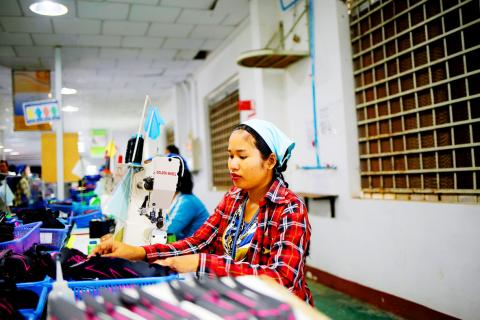Reuters, KAMPONG SPEU, Cambodia
Whoever wins Cambodia’s general election next week, 27-year-old Khen Srey Touch knows only that she will have to keep working hard for years to come.
Already the mother of a four-year-old boy, she is due to give birth to a girl within two weeks, but maintains a punishing schedule in a shoe factory, working about 10 hours a day, six days a week.

Photo: Reuters
“I am the main breadwinner of the house,” Khen Srey Touch told a photographer who spent a few days with her family in their village southwest of the capital, Phnom Penh.
Each morning she catches a ride in an open pickup truck to a footwear factory owned by a Taiwanese company. She earns US$240 a month making shoes for US, British and Japanese brands.
It is dark when she returns home to cook the evening meal and wait for her husband, a temporary construction worker.
Khen Srey Touch is among thousands of workers in the garment industry who are being courted by Cambodian Prime Minister Hun Sen ahead of the election on July 29.
Like many Cambodians, she has known no other leader but Hun Sen.
“He is the only person who has ruled the country and I don’t know why,” she said.
Hun Sen, who has ruled Cambodia for more than 30 years, is trying to ensure victory after two close elections in 2013 and last year by handing out cash inducements and a series of punishing measures against the opposition.
His government has targeted opposition politicians, civil society groups and independent media ahead of the poll, which he appears set to win easily.
Hun Sen has also been a fixture at campaign rallies with garment workers, promising them more benefits and handing cash envelopes to pregnant employees.
Khen Srey Touch said she knew it was important to cast her vote, but she understood little about political parties.
Whatever the election outcome, she was determined her children would have a better life.
“I want my children to have a good education ... not to be like me and my husband,” she said.

Seven people sustained mostly minor injuries in an airplane fire in South Korea, authorities said yesterday, with local media suggesting the blaze might have been caused by a portable battery stored in the overhead bin. The Air Busan plane, an Airbus A321, was set to fly to Hong Kong from Gimhae International Airport in southeastern Busan, but caught fire in the rear section on Tuesday night, the South Korean Ministry of Land, Infrastructure and Transport said. A total of 169 passengers and seven flight attendants and staff were evacuated down inflatable slides, it said. Authorities initially reported three injuries, but revised the number

A colossal explosion in the sky, unleashing energy hundreds of times greater than the Hiroshima bomb. A blinding flash nearly as bright as the sun. Shockwaves powerful enough to flatten everything for miles. It might sound apocalyptic, but a newly detected asteroid nearly the size of a football field now has a greater than 1 percent chance of colliding with Earth in about eight years. Such an impact has the potential for city-level devastation, depending on where it strikes. Scientists are not panicking yet, but they are watching closely. “At this point, it’s: ‘Let’s pay a lot of attention, let’s

‘BALD-FACED LIE’: The woman is accused of administering non-prescribed drugs to the one-year-old and filmed the toddler’s distress to solicit donations online A social media influencer accused of filming the torture of her baby to gain money allegedly manufactured symptoms causing the toddler to have brain surgery, a magistrate has heard. The 34-year-old Queensland woman is charged with torturing an infant and posting videos of the little girl online to build a social media following and solicit donations. A decision on her bail application in a Brisbane court was yesterday postponed after the magistrate opted to take more time before making a decision in an effort “not to be overwhelmed” by the nature of allegations “so offensive to right-thinking people.” The Sunshine Coast woman —

BORDER SERVICES: With the US-funded International Rescue Committee telling clinics to shut by tomorrow, Burmese refugees face sudden discharge from Thai hospitals Healthcare centers serving tens of thousands of refugees on the Thai-Myanmar border have been ordered shut after US President Donald Trump froze most foreign aid last week, forcing Thai officials to transport the sickest patients to other facilities. The International Rescue Committee (IRC), which funds the clinics with US support, told the facilities to shut by tomorrow, a local official and two camp committee members said. The IRC did not respond to a request for comment. Trump last week paused development assistance from the US Agency for International Development for 90 days to assess compatibility with his “America First” policy. The freeze has thrown